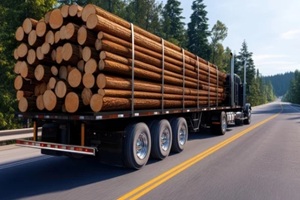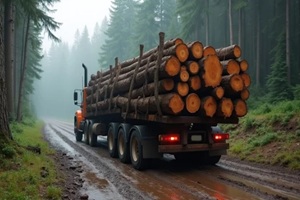
The logging industry is known to be particularly dangerous, and not just for the workers out cutting trees. Log trucking is similarly hazardous due to the heavy and often inconsistently shaped loads, travel on less-maintained roadways, and contention with challenging weather patterns. These are just a few of the many risks that a trucker for a logging operation may face, and companies should select log truck insurance that covers all these gaps and more.
However, it can be difficult to predict what issues may arise, and businesses often do not have the margins to fund extraneous insurance policies they will not use. Here are some ways to prevent disasters in your company’s logging expeditions by choosing the right insurance for the primary hazards of log trucking.
Cargo Insurance
Log trucking transports the valuable timber gathered from the worksite to its next destination. If this material is lost, the company may face numerous consequences: lost income from the timber, harm to its reputation with suppliers, lawsuits from people whose property was destroyed by timber if it fell loose and more. Cargo insurance can protect a logging company from the financial ramifications of a loss during transport.
Always review the details carefully to establish that your cargo insurance will address all your needs. Does it cover only timber up to a certain weight or value? Are certain types of transport, such as over water or in a specific kind of trailer, included?
Auto Insurance
A log truck is a valuable resource, often worth a hundred thousand dollars or more. For logging businesses, the risk of losing this investment due to damage during work is significant, requiring a strong auto insurance policy. Establish that the policy addresses log trucks specifically, as standard auto policies may not include the necessary provisions to provide complete coverage for industry-specific vehicles.
Workers’ Compensation Insurance
Every logging company needs workers’ compensation insurance, but make sure that it applies not just to those on the job site but also to drivers. Log truck drivers face significant risks during their routes, from hazardous road conditions to unmaintained roads. If a driver is injured, the logging company should be able to rely on their workers’ compensation insurance to pay for medical treatment and any necessary rehabilitation.
Pollution Insurance
Pollution insurance is an often overlooked policy that should be closely tied to log trucking. Large log trucks are hotbeds for minor issues such as small oil leaks, diesel spills, and other mishaps. However, in the broad natural vistas in which logging takes place, these seemingly minuscule environmental impacts can come with extremely dire consequences.
Any logging company found to have polluted the natural environment where their work is taking place could face large fines and even legal action. Thus, the logging company would be responsible not just for the fines and the cost of legal representation but also for the fees to remediate the area and restore its safety. Pollution insurance protects against this exclusive risk that log trucks can pose.
General Liability Insurance

Log trucking requires the use of large and often cumbersome vehicles. Only these machines are powerful enough to haul heavy timber securely. However, they can also pose a larger-than-average threat to the people and places around them. Even skilled drivers can find these massive vehicles challenging to operate, and other drivers may not know how to respond around them, leading to accidents.
Similarly, a log truck can easily tear up private property by making turns or damaging loading bays when delivering the timber. No matter how the log truck causes damage or injury to others, the logging company would be left responsible for the resulting costs. These costs could include fixing the damaged area, replacing destroyed property, paying for an affected person’s medical bills, and more.
All logging companies must carry some general liability insurance, but this is not an area in which to skimp on coverage to save money. Most log trucking businesses will secure general liability protection in excess of a million dollars.
Secure Your Log Trucks With the Pros
Whether your business is new to the log trucking industry or is reevaluating its insurance coverage after many years, be sure to work with industry professionals who understand the exclusive needs and risks loggers face. The professionals at Burton & Company can provide customized insurance solutions that address the specific needs your log trucks may be facing during their routes.
Contact Burton & Company today to schedule an appointment, share your company goals and pain points, and build an insurance collective that leaves you without dangerous gaps in coverage.

